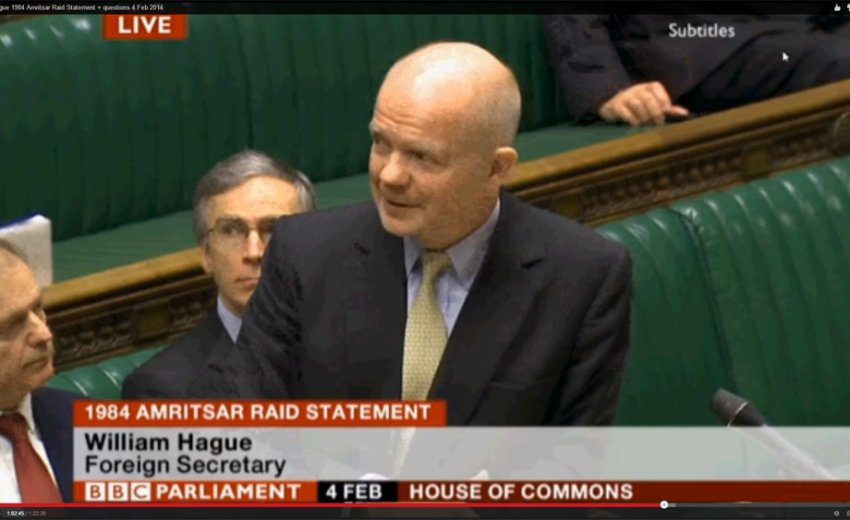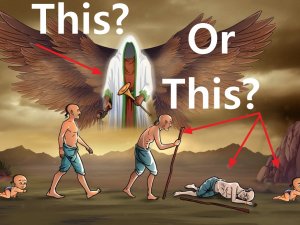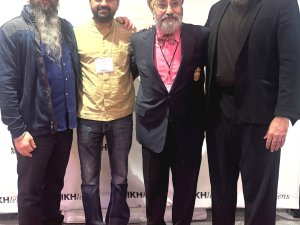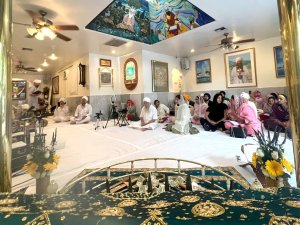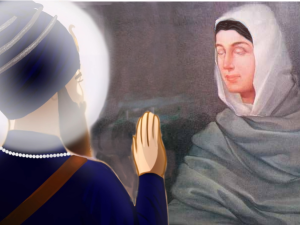Less than a month ago two previously top secret documents were recovered which show correspondence between the Thatcher and Gandhi government in 1984 about “communal violence in the Punjab”. Prime Minister David Cameron promptly called for an inquiry and promised an investigation into the matter would be transparent and thorough.
As a result the Cabinet Secretary, Sir Jeremy Heywood, conducted an investigation of thousands of possibly relevant documents. February 4th 2014 the British government has made 5 of these previously top secret documents open to the public. The report also gives summaries of the events, emphasizing points that distance the Thatcher government from the horror and disaster that followed in 1984, deny commercial military motives or misleading of parliament.
UK Foreign Secretary William Hague gave a statement today presenting the report on the collaboration of the UK and Indian government in 1984 in an open session with British Members of Parliament (MP’s).
Click here to read the Secretary’s report via UK government website
Video of the Secretary’s report along with the questions and answers that followed.
It is interesting to note the tone of the session. Most Members of Parliament spoke representing the concerns of their Sikh constituents and Sikhs in general. The report was generally questioned rather than flatly accepted. We may muse at how conversant and sympathetic most members show themselves to be towards Sikh sentiments.
One example is Labor MP Tom Watson who took exception to the tone of the Foreign Secretary, “I have to say to the Foreign Secretary: In the year we commemorate the loss of 80,000 Sikhs in the 1914-18 war, isn’t the least we can do to apologize to those Sikhs who were mislead in 1984?”
Many MP’s called for more answers, requesting a broader investigation which would include any interactions between the two countries especially for the period after the attack. Some MP's asked for an apology to the Sikh community. One asked if the current government could do anything internationally to uncover more information. The Secretary’s general response was that the UK government was not responsible for atrocities or actions of the Indian government and therefore is not in a position to apologize. The Secretary reminded the MP’s that Prime Minister Cameron did visit Amritsar and did apologize for the British massacre of Sikhs in the Jallianwala Bhag massacre.
Secretary Hague several times restated that the investigation examined only one interaction and emphasized that there is no evidence of further British involvement in 1984. He repeatedly represented that the report is transparent and comprehensive, releasing documents that otherwise would not be released. In response to a request for an independent judge led inquiry to allay any possible suspicion of a cover-up he responded, “I don’t think it is possible to read this report and conclude that a cover up has taken place. It’s the very opposite of that. It is the most senior civil servant in the country looking at things in a dispassionate and of course nonpartisan way.”
Shadow Foreign Secretary Douglas Alexander asked many questions to Secretary Hague including the following, “Indeed the Foreign Secretary spoke just a few moments ago of the exchange of correspondence between Prime Minister Gandhi and Prime Minister Thatcher and yet only Prime Minister Gandhi’s letter appears to have been published today. Will he undertake now to publish the response of Prime Minister Thatcher?”
The Foreign Secretary responded to the several questions posed by Alexander but did not directly address this specific question.
Outside of the session, a notable reaction came from the first turbaned Sikh to sit in the UK’s House of Lords. Lord Indarjit Singh called the statement of Secretary Hague, “smug and condescending.”
Today’s events can been seen a few different perspectives. One is that there are many questions yet to be answered. Another is to see that awareness of these issues and support for the Sikh community has risen to a level not imaginable just a few years ago. Like the new policy on beards in the U.S. military and the promise from AAP to investigate 1984, we can say "It is a step in the right direction. But it remains to be see if it will go far enough". Let us take the opportunity to appreciate that it IS indeed a step in the right direction". Think about this statement: Over a dozen Parliamentarians in the UK have spoken out for Sikh justice. Perhaps we will, in our lifetimes, see the day when the world will see a Sikh and proudly know just who we are. Whatever the future holds, let us not forget to trust in the Guru's plan as we forge forward.
